Abstract
OBJECTIVE--To assess the validity, reliability, and acceptability of the short form 36 (SF 36) health survey questionnaire (a shortened version of a battery of 149 health status questions) as a measure of patient outcome in a broad sample of patients suffering from four common clinical conditions. DESIGN--Postal questionnaire, followed up by two reminders at two week intervals. SETTING--Clinics and four training practices in north east Scotland. SUBJECTS--Over 1700 patients aged 16-86 with one of four conditions--low back pain, menorrhagia, suspected peptic ulcer, or varicose veins--and a comparison sample of 900 members of the general population. MAIN OUTCOME MEASURES--The eight scales within the SF36 health profile. RESULTS--The response rate exceeded 75% in the patient population (1310 respondents). The SF36 satisfied rigorous psychometric criteria for validity and internal consistency. Clinical validity was shown by the distinctive profiles generated for each condition, each of which differed from that in the general population in a predictable manner. Furthermore, SF36 scores were lower in referred patients than in patients not referred and were closely related to general practitioners' perceptions of severity. CONCLUSIONS--These results provide support for the SF36 as a potential measure of patient outcome within the NHS. The SF36 seems acceptable to patients, internally consistent, and a valid measure of the health status of a wide range of patients. Before it can be used in the new health service, however, its sensitivity to changes in health status over time must also be tested.
Full text
PDF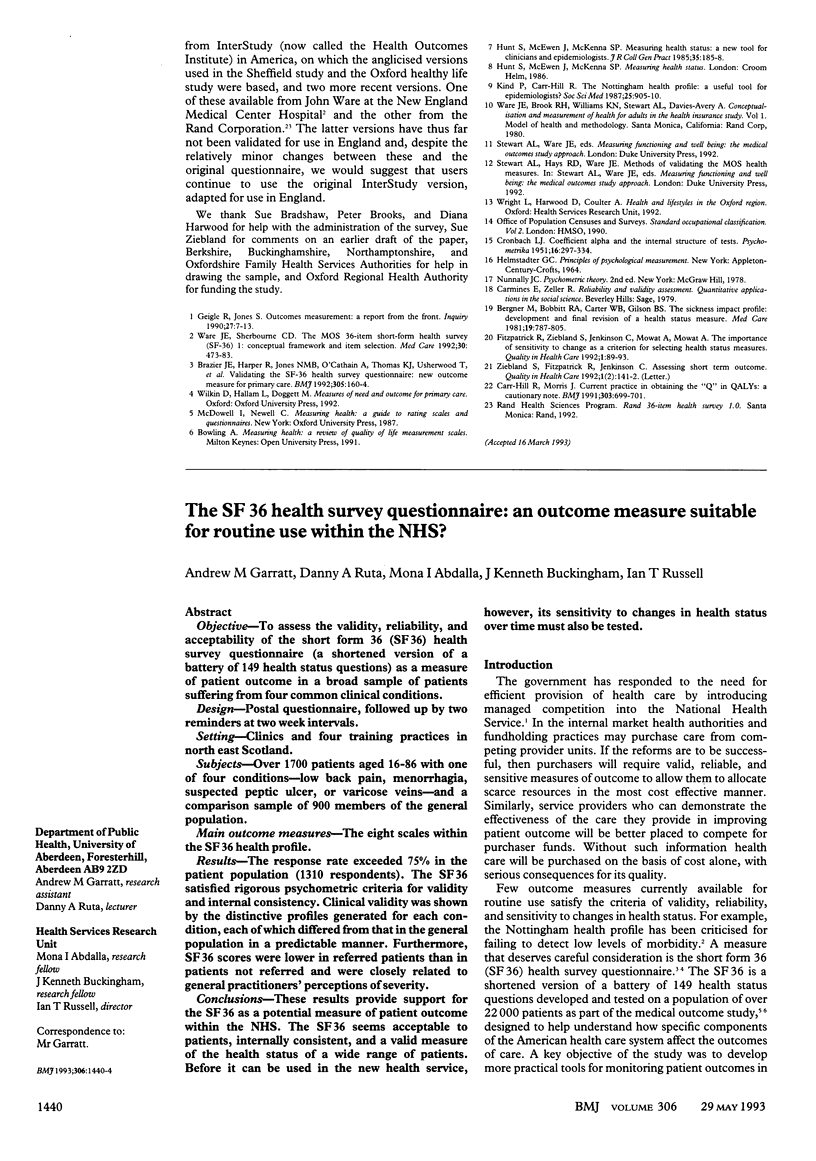
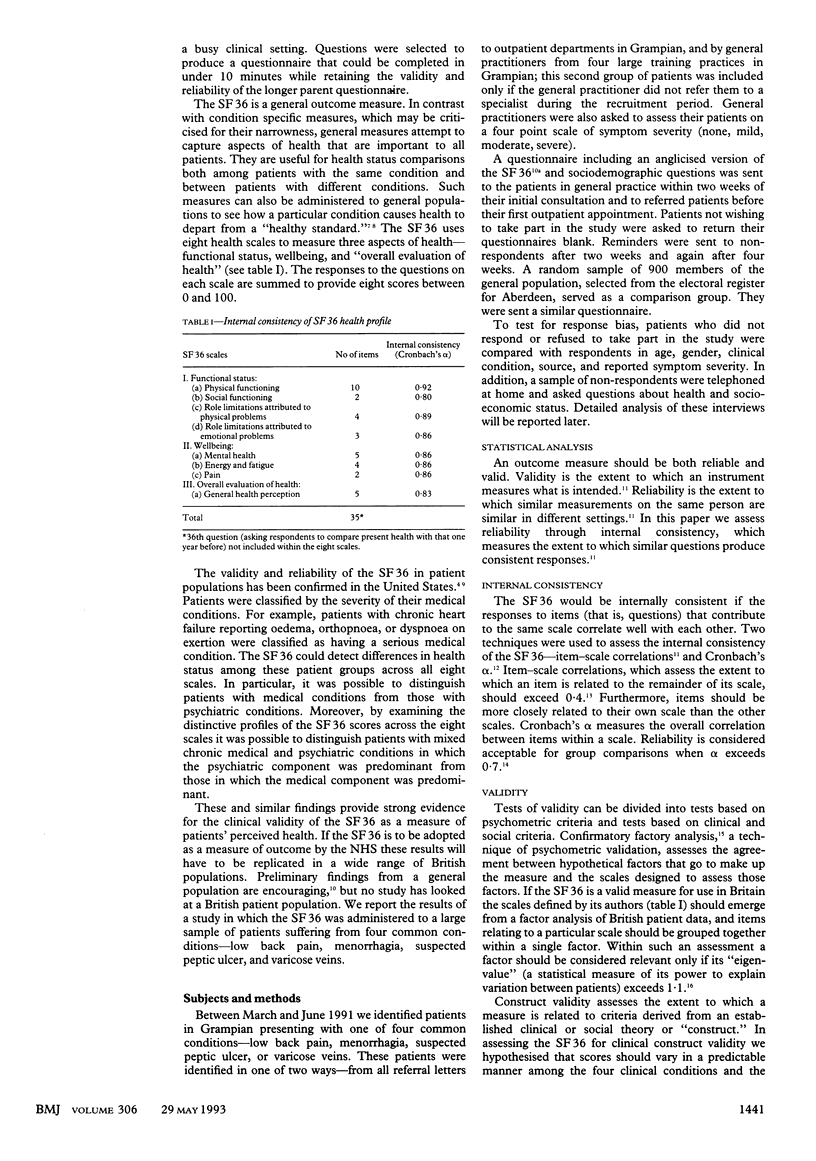
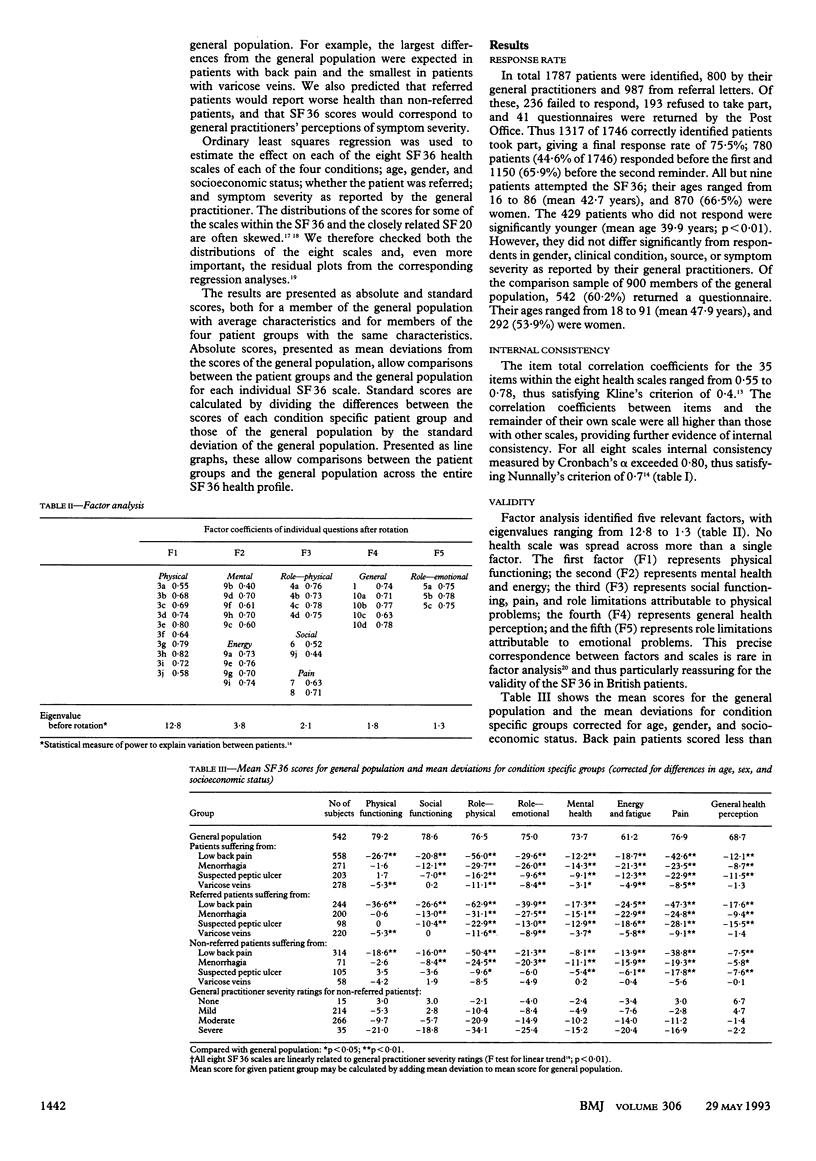
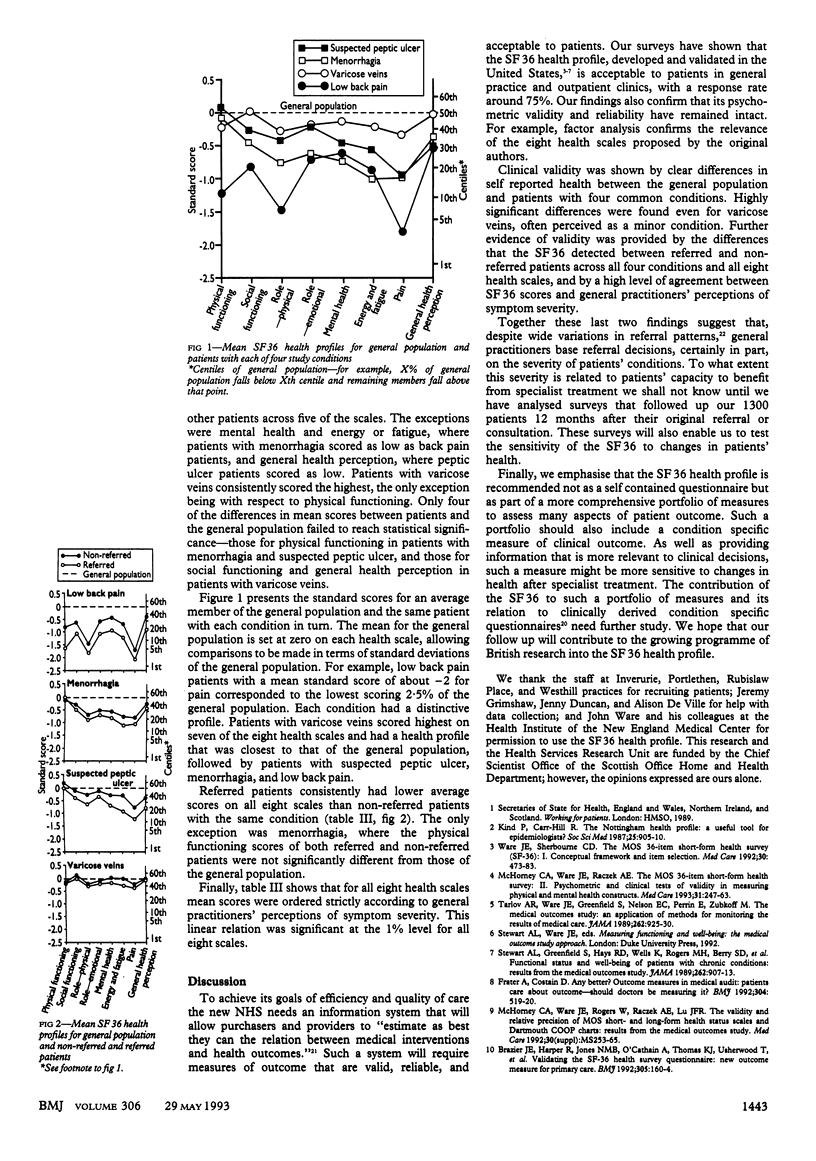
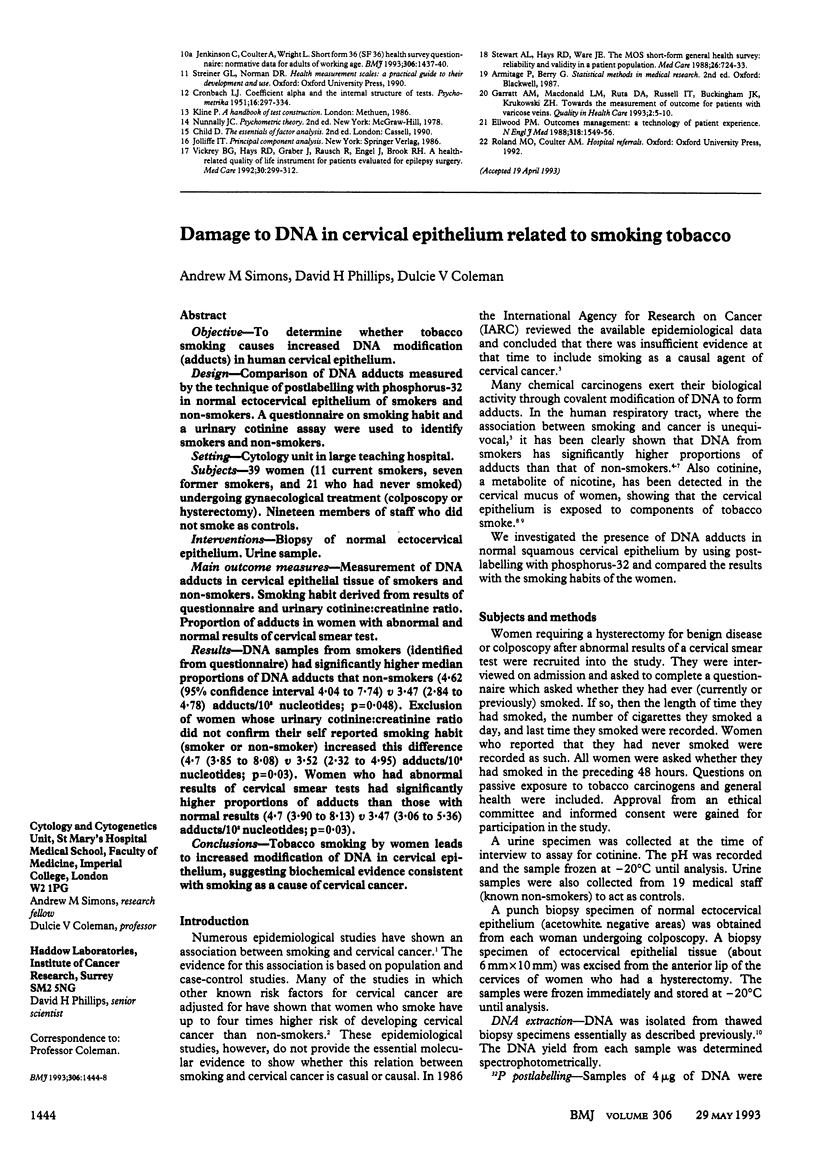
Selected References
These references are in PubMed. This may not be the complete list of references from this article.
- Brazier J. E., Harper R., Jones N. M., O'Cathain A., Thomas K. J., Usherwood T., Westlake L. Validating the SF-36 health survey questionnaire: new outcome measure for primary care. BMJ. 1992 Jul 18;305(6846):160–164. doi: 10.1136/bmj.305.6846.160. [DOI] [PMC free article] [PubMed] [Google Scholar]
- Ellwood P. M. Shattuck lecture--outcomes management. A technology of patient experience. N Engl J Med. 1988 Jun 9;318(23):1549–1556. doi: 10.1056/NEJM198806093182327. [DOI] [PubMed] [Google Scholar]
- Frater A., Costain D. Any better? Outcome measures in medical audit. BMJ. 1992 Feb 29;304(6826):519–520. doi: 10.1136/bmj.304.6826.519. [DOI] [PMC free article] [PubMed] [Google Scholar]
- Garratt A. M., Macdonald L. M., Ruta D. A., Russell I. T., Buckingham J. K., Krukowski Z. H. Towards measurement of outcome for patients with varicose veins. Qual Health Care. 1993 Mar;2(1):5–10. doi: 10.1136/qshc.2.1.5. [DOI] [PMC free article] [PubMed] [Google Scholar]
- Jenkinson C., Coulter A., Wright L. Short form 36 (SF36) health survey questionnaire: normative data for adults of working age. BMJ. 1993 May 29;306(6890):1437–1440. doi: 10.1136/bmj.306.6890.1437. [DOI] [PMC free article] [PubMed] [Google Scholar]
- Kind P., Carr-Hill R. The Nottingham health profile: a useful tool for epidemiologists? Soc Sci Med. 1987;25(8):905–910. doi: 10.1016/0277-9536(87)90260-7. [DOI] [PubMed] [Google Scholar]
- McHorney C. A., Ware J. E., Jr, Raczek A. E. The MOS 36-Item Short-Form Health Survey (SF-36): II. Psychometric and clinical tests of validity in measuring physical and mental health constructs. Med Care. 1993 Mar;31(3):247–263. doi: 10.1097/00005650-199303000-00006. [DOI] [PubMed] [Google Scholar]
- McHorney C. A., Ware J. E., Jr, Rogers W., Raczek A. E., Lu J. F. The validity and relative precision of MOS short- and long-form health status scales and Dartmouth COOP charts. Results from the Medical Outcomes Study. Med Care. 1992 May;30(5 Suppl):MS253–MS265. doi: 10.1097/00005650-199205001-00025. [DOI] [PubMed] [Google Scholar]
- Stewart A. L., Greenfield S., Hays R. D., Wells K., Rogers W. H., Berry S. D., McGlynn E. A., Ware J. E., Jr Functional status and well-being of patients with chronic conditions. Results from the Medical Outcomes Study. JAMA. 1989 Aug 18;262(7):907–913. [PubMed] [Google Scholar]
- Stewart A. L., Hays R. D., Ware J. E., Jr The MOS short-form general health survey. Reliability and validity in a patient population. Med Care. 1988 Jul;26(7):724–735. doi: 10.1097/00005650-198807000-00007. [DOI] [PubMed] [Google Scholar]
- Tarlov A. R., Ware J. E., Jr, Greenfield S., Nelson E. C., Perrin E., Zubkoff M. The Medical Outcomes Study. An application of methods for monitoring the results of medical care. JAMA. 1989 Aug 18;262(7):925–930. doi: 10.1001/jama.262.7.925. [DOI] [PubMed] [Google Scholar]
- Vickrey B. G., Hays R. D., Graber J., Rausch R., Engel J., Jr, Brook R. H. A health-related quality of life instrument for patients evaluated for epilepsy surgery. Med Care. 1992 Apr;30(4):299–319. doi: 10.1097/00005650-199204000-00002. [DOI] [PubMed] [Google Scholar]
- Ware J. E., Jr, Sherbourne C. D. The MOS 36-item short-form health survey (SF-36). I. Conceptual framework and item selection. Med Care. 1992 Jun;30(6):473–483. [PubMed] [Google Scholar]



